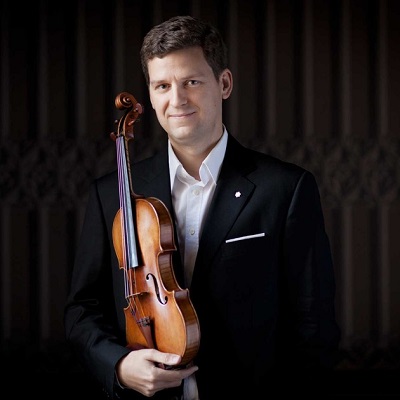 I started early on in the month with the second of two concerts given by James Ehnes of Bach's solo violin sonatas and partitas at St George's Hall.
I started early on in the month with the second of two concerts given by James Ehnes of Bach's solo violin sonatas and partitas at St George's Hall.
October has been a month of music (two concerts), theatre (a cinecast of a show from London) and music/theatre (two operas - one cinecast and one live).
 I started early on in the month with the second of two concerts given by James Ehnes of Bach's solo violin sonatas and partitas at St George's Hall.
I started early on in the month with the second of two concerts given by James Ehnes of Bach's solo violin sonatas and partitas at St George's Hall.
In some respects, all that I can do is to reiterate what I said about the first concert.
Ehnes created a sound world of intricate and crystaline patterns whose beauty and emotive power were sublime. It's an amazing experience because the baptismal immersion is cool from the intellectual rigour and warm from the depth of feeling.
It's a thought that it will be April 2017 before I drive to my next concert in the light. Hey ho.
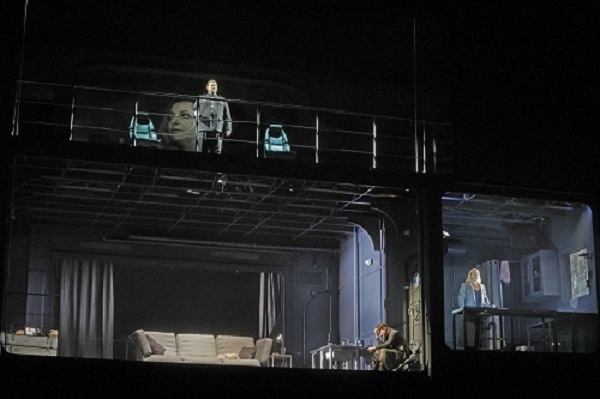 A few days later, I moved to the opposite end of the sonic spectrum once more with the cinecast of Wagner's Tristan und Isolde from the New York Met. Everything I had read about the experience beforehand had told me that the music-making under Simon Rattle was fabulous and that Mariusz Trelinski's production was pants. Over the course of five hours, I got to see and hear for myself.
A few days later, I moved to the opposite end of the sonic spectrum once more with the cinecast of Wagner's Tristan und Isolde from the New York Met. Everything I had read about the experience beforehand had told me that the music-making under Simon Rattle was fabulous and that Mariusz Trelinski's production was pants. Over the course of five hours, I got to see and hear for myself.
Certainly, orchestra and chorus were everything that you would expect from the Met and Simon led a performance of the score that had remarkable depths of clarity and a flow and pulse that was like the sea itself sometimes turbulent, sometimes placcid, sometimes surging, sometimes rolling gently.
Nina Stemme is a remarkable singing actress. She doesn't have a large scale voice like some of the Wagnerian sopranos of the 1950s but she has a voice which penetrates and which projects words as well as sounds often with great beauty.
Stuart Skelton's Tristan has stamina but not the most lyrical of voices. However, he did give the best account I have yet to witness of his long scene at the beginning of Act Three where Tristan's mind slowly unhinges.
It's not really an opera where you can talk of secondary roles. Ekaterina Gubanova's Brangäne worked hard with a lot of extra business particularly in Act One where she as asked to do a lot of traipsing about the set with messages and their answers. Evgeny Nikitin gave us a bluff and gruff Kurwenal with a bluff anf gruff voice. René Pape may have been luxury casting for King Marke and his voice is very beautiful but I'm not sure I had any sense of royalty or authority from him: it was as though he had come prepared to give us his Kurneval.
It's difficult for me to talk about the production as the cinema presentation was not a helpful representation of the stage picture. The set was an ocean going vessel somewhere between a military and a commercial vessel but one which, conveniently, had a state room for guests such as a princess. The view through the proscenium arch was divided into a number of rooms with characters present and engaged in a variety of business so that the camera's focus on the room in which any singing was happening cut out much of the secondary action.
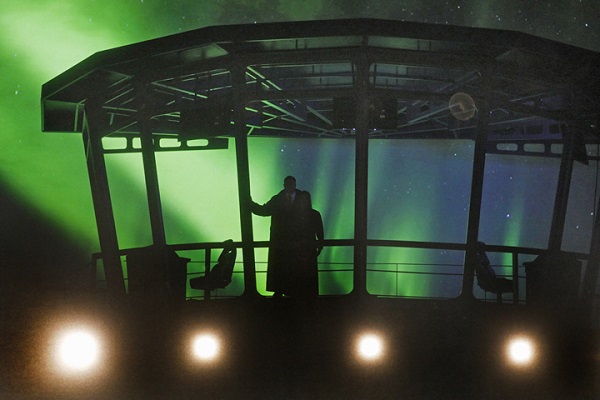
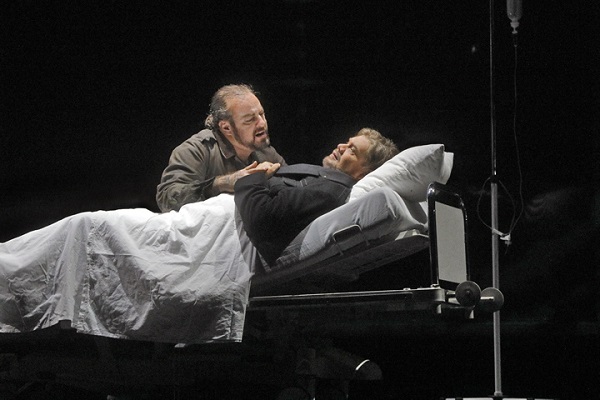
Whether that was helpful or not I do not know. What I did sense was the the cinema audience were not seeing the video projections in full and that proved to be a great distraction. Only once were we allowed to see them in full and that was during Act Three when we were treated to an extra bit of drama filling in Tristan's back story.
Other than that, it was all very black - never a good choice when you want to see people's faces to read their emotions and their lips to be able to hear what the words are.
So, glad to have done it but I wouldn't re-visit this version ever again.
 Over to the Phil for a concert of pretty much all pieces by Rachmaninov - right up Vassily's street really.
Over to the Phil for a concert of pretty much all pieces by Rachmaninov - right up Vassily's street really.
The odd work out was Stravinsky's jokey little Scherzo à la Russe which started up the second half for us.
Starting the first half, we had had Rachmaninov's early Symphonic Poem The Rock which sounded appropriately numinous with some very beautiful playing from the strings.
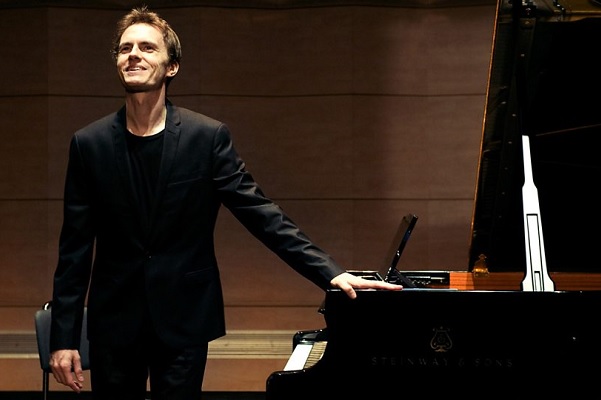 Alexandre Tharaud treated us to a very interesting reading of Rachmaninov's Piano Concerto No2. Normally it's the soundtrack of choice for pianists wishing to storm barns.
Alexandre Tharaud treated us to a very interesting reading of Rachmaninov's Piano Concerto No2. Normally it's the soundtrack of choice for pianists wishing to storm barns.
This was much more measured, controlled and introspective, almost warey of itself as though something wild and ungovernable might break out at any moment.
I liked it and Tharaud liked the applause so much that he came on and gave us Rachmaninov's C sharp minor Prelude as a very welcome encore.
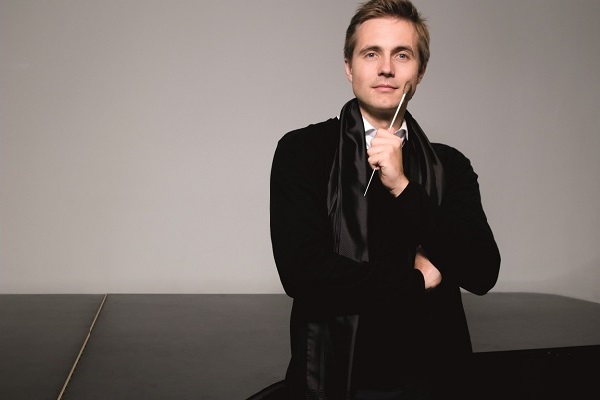 Rachmaninov Symphonic Dances
Symphonic Dances was superb. Amazing clarity of detail in the orchestra. A performance that packed punch whilst testing the ears at the lowest end of the dynamic range. Note to the people who clapped five bars early. Watch the conductor's hands if you're unsure if the piece has finished.
The dynamic range of the Symphonic Dances will try the technique of the BBC engineers who were recording it for broadcast on Wednesday!
Rachmaninov Symphonic Dances
Symphonic Dances was superb. Amazing clarity of detail in the orchestra. A performance that packed punch whilst testing the ears at the lowest end of the dynamic range. Note to the people who clapped five bars early. Watch the conductor's hands if you're unsure if the piece has finished.
The dynamic range of the Symphonic Dances will try the technique of the BBC engineers who were recording it for broadcast on Wednesday!
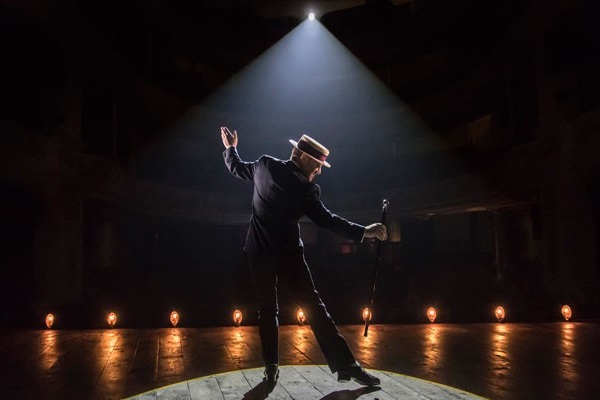 I went to the cinecast of John Osborne's The Entertainer with hopes. Maybe not high hopes but there was enough about it, even without taking into account Kenneth Branagh's assumption of the main role (Archie Rice) first created by Lord Olivier, to make me feel that this could be an occasion.
I went to the cinecast of John Osborne's The Entertainer with hopes. Maybe not high hopes but there was enough about it, even without taking into account Kenneth Branagh's assumption of the main role (Archie Rice) first created by Lord Olivier, to make me feel that this could be an occasion.
I caught Corin Redgrave in that tortured main role at Liverpool Playhouse some years back and, though he as excellent in his own way, I felt that there was a lot in the play that was left unsaid.
The play seems to me to be about a series of culture clashes. Partially this is to do with the classic dichotome of the public and the private but it is also to do with the State and Society in general.
Just as, by the early 60s, Music Hall was all but dead and any attempt to revive or maintain its traditions were futile (which is what we witness as the surface action of the play), England (and particularly England within the United Kingdom and maybe even more specifically the Home Counties within England) was a dead duck on the world stage and the sense of the loss of Empire was recognised at the same time as the status was still embraced.
These uncertainties, as felt by a generation which had just made a major sacrifice on the battlefields of Europe, were being by-passed by a younger generation which aspired to something different. This, to me, is how the metaphor of the play works.
This presentation gave us seedy glamour and fraught personal and familial relationships but didn't ever move out into something more universal. On its own level, it was a very good but I kept feeling that it could have been so much more.
 Then Roland and I went over to Leeds for Opera North's new presentation of Britten's Billy Budd. I've seen excellent productions in the last decade at ENO and, by the useful medium of the cinecast, at the Glyndebourne Festival.
Then Roland and I went over to Leeds for Opera North's new presentation of Britten's Billy Budd. I've seen excellent productions in the last decade at ENO and, by the useful medium of the cinecast, at the Glyndebourne Festival.
This presentation did not match up to either of those (particularly the sensational Glyndebourne show) whilst being reasonable in its own right. There were some captivating portrayals especially Alan Oke as Captain Vere, Roderick Williams as Billy Budd and Alastair Miles as Claggart. The chorus and orchestra were fine.
The balance of sound with the stage and the pit was suspect at times and the production did not offend but failed to engage. I felt that the parts were more than the the sum of whole.

